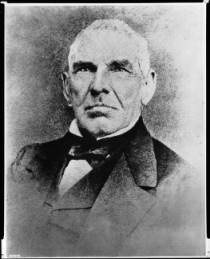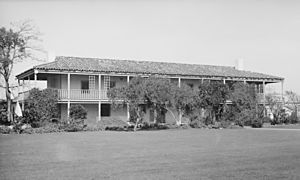Juan Temple facts for kids
Quick facts for kids
Juan Temple
|
|
|---|---|
 |
|
| Born | August 14, 1796 |
| Died | May 31, 1866 |
| Spouse(s) | Rafaela Cota |
Don Juan Temple (born Jonathan Temple; August 14, 1796 – May 31, 1866) was a wealthy ranch owner and merchant in California. He was born in Massachusetts, a state in the eastern United States. In 1827, he moved to Alta California, which was then part of Mexico. He became a Mexican citizen, learned to speak Spanish, and took a Spanish name, Juan. He also married into a well-known local family. After buying Rancho Los Cerritos in 1843, he became one of the biggest landowners in Los Angeles County.
Contents
Biography of Juan Temple
Jonathan Temple was born in Reading, Massachusetts. His parents were Jonathan Temple Sr. and Lucinda Pratt. Before moving to California, Temple worked as a merchant in the Hawaiian Islands starting around 1823.
Moving to Mexican California
In 1827, Juan Temple moved to the Pueblo de San Diego. A "pueblo" was like a town or settlement. In California, he became a Roman Catholic and a Mexican citizen. He then started using the name Juan. In the same year, Temple moved north to the Pueblo de Los Ángeles. There, he opened the town's very first general store. He ran this successful business for almost 30 years. His younger brother, Francisco P. Temple, later joined him in Los Angeles.
Family and Community Role
Juan Temple married Rafaela Cota in 1830. She was born in 1812 and passed away in 1887. They had one daughter named Francisca Temple, who was born in 1831. In 1836, Temple allowed the first "vigilance committee" in California to meet at his home. This was a group of citizens who took action to keep order in the community.
Rancho Los Cerritos: A Vast Estate
In 1843, Juan Temple bought Rancho Los Cerritos. A "rancho" was a very large farm or ranch. He bought it from his wife's relatives, the Cota family. The adobe house he built in 1844 is still standing today. This house is now part of the Los Cerritos Ranch House, which is a National Historic Landmark. This means it's a very important historical place.
Ranching and Business Success
Both Temple and his ranch played a part in the Mexican-American War. Juan Temple turned Rancho Los Cerritos into a very successful cattle ranch. He became very rich from this business. After California became a state, he was one of the wealthiest people in Los Angeles County. He was second only to Abel Stearns in wealth.
During the 1840s, Temple was also involved in trade by ship. He traded goods along the coasts of California and central Mexico. He also owned a lot of land between Acapulco and Mazatlán in Mexico.
Juan Temple's Impact on Los Angeles
Juan Temple was one of the first people to help build up Los Angeles. He built important buildings like the original Temple Block. He also built the Clocktower Courthouse, Market and Theater. This building was used as the city and county offices. It also had the county's courthouse and the first real theater in southern California.
Political Roles and City Development
After the United States took control of Los Angeles during the Mexican-American War, Temple served as the first "alcalde." An "alcalde" was like a mayor. He also served on the first city council during the American period. In 1849, Los Angeles needed a survey of its land but couldn't pay for it. Temple paid for the Ord Survey himself. He was later paid back when the city sold the new land lots created by the survey. Temple Street (Los Angeles) was a small dirt road he developed in the 1850s.
Challenges and Later Life
In the late 1850s, Los Angeles faced an economic slowdown. This made it hard for Temple's building projects. Things got even worse with a huge flood in 1861-62. Then, a drought from 1862 to 1865 severely damaged the cattle industry. This industry was the main support of the local economy at the time.
Later Years in San Francisco
Juan Temple moved to San Francisco later in his life. He passed away there in 1866. This was just two months after he sold Rancho Los Cerritos to Flint, Bixby & Co. He sold it for $20,000, which was less than a dollar per acre. This happened during a time when land prices were very low.
After Juan Temple's death, his wife, Rafaela Cota de Temple, moved to Paris. She joined her daughter there, who was a widow. Rafaela passed away in Paris in 1887.
See also
- Workman and Temple Family
- Pliny Fisk Temple (Francisco P. Temple or F.P.T ) (February 13, 1822–April 27, 1880)
- Josephine M. Workman–Mona Darkfeather (January 13, 1883–September 3, 1977)
- Boyle-Workman family
- William H. Workman (January 1, 1839–February 21, 1918)
- Boyle Workman (September 20, 1868–December 25, 1942)
- Workman and Temple Family Homestead Museum
 | Jessica Watkins |
 | Robert Henry Lawrence Jr. |
 | Mae Jemison |
 | Sian Proctor |
 | Guion Bluford |


